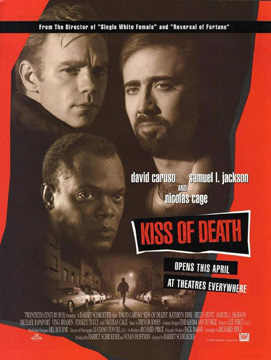
Welcome to the next CHUD List.
We’ve
tackled our our disappointments, our essentials list and slowly exhumed
our Kills List from 2003, and now that we’ve begun the beguine, we must
continue. Behold:
The CHUD.com Top 50 Guilty Pleasures.
We’ve
all got those little flicks that we know are wrong, but feel so right.
And after our preceding list of disappointment, we decided to cleanse
the palate by honoring our favorite guilty pleasures. These are films
that are flawed and often completely indefensible, but we can’t help but
love them anyway. As before, from a master list of over 100, the
involved parties (Devin, Jeremy, Micah, Russ, and Nick) all killed
off a choice for each one we claimed. As a result, we’ll run a big list
at the end of this of the ‘ones that got away’. So, here are the Top 50
Guilty Pleasures. Two a day, every week day for five weeks. In no
particular order: #32
#32
Kiss of Death
(1995, Dir. Barbet Schroeder)
Why
It’s a Guilty Pleasure: First of all, there’s no reason in sweet beloved Hades that Barbet Schroeder should have fallen so far from the awards magnet tree in time to make a David Caruso flick in the mid-90’s. Talk about a reversal of fortune.
And that’s nothing against the red-headed Hollywood mini-legend. I love the man, from his Golden Axe/Altered Beast dubbed impaling in First Blood to his surprising badassery in Proof of Life, the guy’s a big balmy pale ball of magic. I love the Caruso so much that sometimes I’ll get intense and argue with someone without ever looking away from a fixed point on the horizon.
OK, I’ll steal a glance now and then just so I can be assured my intensity is nearing Caruso levels, but only for that.
Have you heard? The man is rocking the Nielsens with CSI: Miami, which is about 800 miles less interesting than rocking the Connie Nielsens but still admirable.
It’s a guilty pleasure because it’s a remake of an almost great film noir (1947, the first exposing of Dick Widmark) littered with folks who either were stars [Nicolas Cage, Samuel L. Jackson], were about to be stars [Ving Rhames, Stanley Tucci, Helen Hunt], or were Michael Rappaport [Michael Rappaport]. I can see how on paper this could have been a prestige project with Schroeder at the helm.
Prestige exited stage left once Nicolas Cage is onscreen displaying more ham than the casting couch for Babe. Muscular and often jumping around, Cage’s character is a riot whether he’s obsessing over metal silverware or punching random people because his dead has died. It’s an Elseworlds Oscar performance and coupled against Caruso’s completely rigid and terse tough guy act and Samuel L. Jackson’s dripping eyeball [literally, his performance can be lumped into two words: DRIPPING EYEBALL] you have a car crash of delicious proportions. Speaking of car crashes…
Signature moment: Helen Hunt, who at the time was still mad about Paul Reiser, is living life on the outside while beau David Caruso counts out his days in the hoosegow. Her reward: slamming death from an oncoming truck. She takes its grille, its engine block, the whole damn load and she takes it hard. Somehow it’s heartening to see Helen Hunt get devastated by a truck in the first act of a film. I envision an alternate cut of Twister featuring this intro, followed by two hours Bill Paxton banging the daylight out of Jami Gertz and cranking up some Loverboy on his boom box to drown out the cries of the tornadoes.
What It’s Missing: It ain’t the original. It’s more like the Innocuous Peck of Death.
My Personal Connection to It: If this movie were a lady and I were single I’d let it suck me off in the back seat of my Chevy.
Watch It With: People who like a good second-tier crime flick. It’s aging like a fine Zima.
– Nick Nunziata
#31
Indecent Proposal (1993, Dir. Adrian Lyne) Why It’s a Guilty Pleasure: Adrian Lyne is an object lesson in the perils of consorting with Zalman King: work just once with the soft-core peddler, ad your reputation is besmirched forever. Lyne’s sole indiscretion was Nine 1/2 Weeks, and it is a dreadful film for which all involved should be roundly excoriated. Though Lyne quickly recovered from this indiscretion with two very good pictures (Fatal Attraction and Jacob’s Ladder), respect was impossible to come by; to many, he’s still nothing more than a poor man’s Alan Parker. And the title most detractors are likely to invoke as Exhibit B for the director’s style-over-substance crimes against cinema is 1993’s Indecent Proposal.
Why It’s a Guilty Pleasure: Adrian Lyne is an object lesson in the perils of consorting with Zalman King: work just once with the soft-core peddler, ad your reputation is besmirched forever. Lyne’s sole indiscretion was Nine 1/2 Weeks, and it is a dreadful film for which all involved should be roundly excoriated. Though Lyne quickly recovered from this indiscretion with two very good pictures (Fatal Attraction and Jacob’s Ladder), respect was impossible to come by; to many, he’s still nothing more than a poor man’s Alan Parker. And the title most detractors are likely to invoke as Exhibit B for the director’s style-over-substance crimes against cinema is 1993’s Indecent Proposal.
The witless screenplay by Amy Holden Jones presents Lyne with a phenomenal degree of difficulty (right from the first line of dialogue, a voiceover variation on the “if you love something, set it free” cliche), but it also allows the filmmaker an opportunity to tether his erotic imagery to material that is romantic in origin rather than tawdry. Granted, the romance in Indecent Proposal is hot tub deep – as will happen when the writer of Beethoven adapts a second-rate practitioner of the airport novel – and not always convincingly played by Woody Harrelson and Demi Moore. With more magnetic leads, Lyne might’ve had a better shot at putting over the central dilemma of renting one’s wife out, for one piddling night of high-end ballin’, to Robert Redford for $1 million.
But where the narrative fails (again and again), Lyne excels at conjuring a depth of feeling that betrays his own fiercely virtuous beliefs. The film might’ve been sold on the lure of ravishment by an aging sex symbol (even though Redford was already looking good and craggy here), but the real sensual heat is saved for the two naughtily photographed bouts of marital sex. These upright impulses might’ve been lingering beneath the surfaces of Foxes and Fatal Attraction (in fact, they probably would’ve been much more pronounced in the latter had the studio not tacked on the pistol-packin’ Archer finale), but they’re shockingly overt in Indecent Proposal. And Lyne connects so deeply to the morality of the piece – aided and abetted by a swooning John Barry score – that he turns what should’ve been nothing more than a cheap sudser into a persuasive paean to monogamy. It’s a beautifully crafted bad film that presaged Lyne’s leap to master filmmaker with the exceptional Lolita and Unfaithful. And I guarantee you these works would be more widely celebrated had Lyne never gone a-wallowing with Zalman King.
Signature Moment: After closing the deal with Redford, Woody’s conscience is pricked by a less-than-reassuring conversation with his scuzzy lawyer friend (Oliver Platt), prompting the poor, compromised sap to make a mad dash for the helipad from which his wife is just about to be whisked away to a night of extravagant, yacht-bound ballin’. For once, Harrelson’s casting makes sense; at the time of the film’s release, his lost-puppy franticness was a heartbreaking counterpoint to the sweet-natured disposition of his character on Cheers. And Barry’s lush cue piercingly underscores the sense of violation.
What It’s Missing: More substantial characters and better leads.
My Personal Connection to It: I paid to see Indecent Proposal during the spring quarter of my freshman year at college, hoping to alleviate the boredom of not studying by heckling a bad movie (such were our crappy options for wasting time in the pre-internet age). For the following week, the only thing being heckled was me for daring to suggest the film had merit. I still hurt.
Watch It With: A woman vulnerable to the cheapest romantic appeal. The night will end well.
– Jeremy Smith